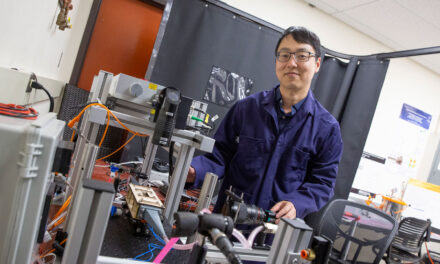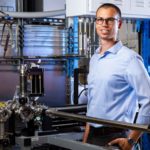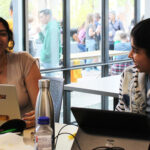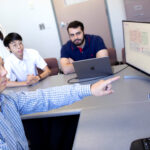
Energized by spirit of social entrepreneurship
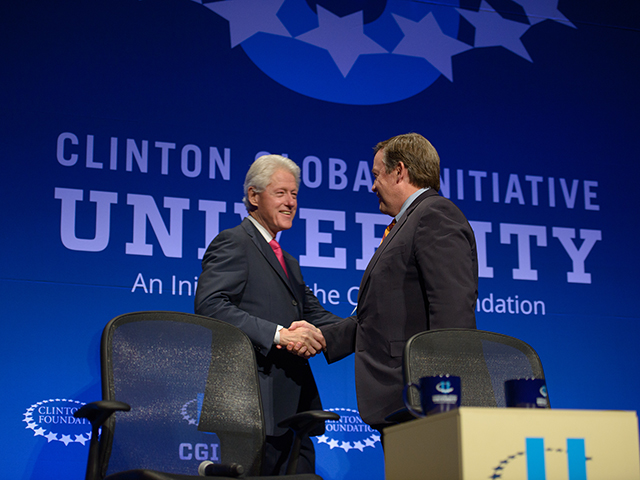
Arizona State University President Michael Crow introduced former U.S. President Bill Clinton, founding chairman of the Clinton Global Initiative, at the opening session of Clinton Global Initiative University Conference at ASU. Students in the Ira A. Fulton Schools of Engineering at ASU participated in the international event focused on developing social entrepreneurship ventures. Photographer: Andy DeLisle/ASU.
Engineering students found motivating boost at Clinton Global Initiative event
More than 40 students in Arizona State University’s Ira A. Fulton Schools of Engineering were among the 1,000-plus college students from about 80 countries who participated in the recent Clinton Global Initiative University (CGI U) conference at ASU.
The selected participants represented student projects with goals of finding solutions to the world’s challenges in education, public health, poverty alleviation, human rights and environmental sustainability.
A weekend of workshops, presentations and discussions about how to launch and propel the projects was led by Chelsea Clinton, vice chair of the Clinton Foundation, former president Bill Clinton and former U.S. Secretary of State Hillary Rodham Clinton.
Students came to develop action plans for their endeavors, network with entrepreneurs and industry leaders, and be mentored by others involved in humanitarian and social transformation efforts.
Meaningful connections
Computer science major Sichun Ai, a student in ASU’s Barrett, The Honors College, and in the Fulton Schools of Engineering Grand Challenge Scholars Program, was thrilled “to be around so many people who were inspired, passionate and motivated” about ventures to make positive global impacts.
Ai is involved in a project to develop wearable computers to provide people who have survived a stroke with low-cost technology that will improve self-rehabilitation methods.
She is working on the project through the Fulton Undergraduate Research Initiative (FURI), which enables ASU undergrads to conduct advanced engineering research.
She met others at the CGI U event who took interest in her project and “made meaningful connections with other future leaders,” she says.
From a practical standpoint, the conference “taught me how to work on a team and how to use social media to market a cause.”
Making commitments
Ngoni Mugwisi, a Barrett honors college student majoring in electrical engineering, says he made connections with those who have been successful with efforts similar to his Diners We Care project, which aims to reduce food waste in ASU dining halls and promote related sustainable practices at the university.
Mugwisi, who is a MasterCard Foundation Scholar, says he learned how even a small local sustainability project can contribute to solutions on a global scale.
Bryan Duarte, who is studying software engineering, says he learned that “change begins with me but the sky is the limit.”
He is helping to lead in a project called QwikEyes, a live video calling service to aid people who are blind with their social, educational and professional interactions.
He hosted an exhibit on his project, which he says gave him an opportunity to interact with hundreds of people who share his interests.
Duarte was particularly inspired by the commitments so many other students he met at CGI U are making to worthy causes. As a result, he says, “I plan to push forward on my current commitment but also work toward creating a new commitment that will make an even bigger impact.”
Opening opportunities
Jake Irvin, a computer science student who has already earned a degree from ASU in marketing and sustainability, represented the FlashFood team, which has developed a mobile application and a website to organize a food recovery network.
FlashFood works with restaurants, dining halls and community groups to get surplus perishable food that might otherwise be wasted to people in need.
At CGI U he was able to meet others involved in similar projects.
“I learned there are a lot more food recovery organizations out there than I thought, and many are led by students at universities,” he says. “This is great because it presents an opportunity for more groups to use the FlashFood app in their food recovery efforts in the future.”
Advancing technology
Chemical engineering major Justin Bessant says he found it energizing simply to listen to so many people from different places talk about their ideas for meeting society’s challenges.
Bessant has teamed with electrical engineering major Jon Zia on the MedBOCS project to develop a medical kit that provides diagnostic tools, and also gives people the capability to share diagnostic data with medical professionals via the Internet.
He and Zia, both Barrett honors college students, hope the toolbox will provide access to quality health care for people in more remote rural communities.
The focus of the project drew Bessant to a CGI U workshop called Beyond Entertainment: Gaming for Health, in which experts talked about the “gamification” of health care.
The workshop examined “how health care innovators are incorporating games into how we treat patients,” Bessant explains. “For example, one new invention is a cube with screens on all six sides. Stroke patients in rehab would play games that help them recover motor skills that were lost after their stroke.”
The experts also talked about different technologies that are on the horizon “that will enable us to better track patient’s health and provide ‘clean’ data for health care professionals and researchers,” he says.
He sees such advances enabling him and Zia “to incorporate new and existing technology into our project.”
Amazing people with good ideas
Mentor Dida says he got valuable advice for his project in talking to Bill Clinton for about eight minutes.
Dida will graduate this semester after studying electronic engineering technology with a focus on alternative energy technologies. He will stay in school to pursue a master’s degree in global technology and entrepreneurship.
Dida wants to start a community service effort in his native Kosovo in Eastern Europe to help alleviate the high unemployment rate for younger people in the country.
He hopes to see the project, called Prosperity Initiative in Kosovo, open a center to teach youngsters about entrepreneurship and sustainability – including finance, research and marketing – to provide them skills needed to find a job or start their on business ventures.
At the CGI U event, he says, “The networking was fantastic. I met some amazing people with good ideas and concepts, and I am planning to work with them in the future.”
Striving for sustainability
The highlight of the event for David Anaya was “meeting equally driven and passionate people from across the nation and the globe, sharing ideas and exchanging useful perspectives on our projects and the state of humanity, and the impact we can make.”
Anaya is finishing studies at ASU for a master’s degree in sustainable engineering. He is also a project manager for PHX Renews, a city of Phoenix effort to promote sustainable living practices.
He helped organize a Day of Action community project at the PHX Renews site, in which more than 600 students attending CGI U participated. He wrote about PHX renews for the Clinton Foundation. … link to http://www.clintonfoundation.org/blog/2014/03/22/day-participation
His project involves “intercepting and diverting a solid waste stream and converting it into a more definitive sustainable product,” he says. “As a result, I am able to offset the environmental impacts associated with traditional disposal, assist the city of Phoenix with its solid waste diversion goals, and support small businesses.”
The endeavor is a finalist in the ASU Innovation Challenge competition, which provides support for innovative student projects aimed at helping global or local communities.
Through GCI U, Anaya says he made connections with leaders of other projects that could be combined with his venture and expand beyond the United States.
Tapping into a network
Kathleen Stefanik, a Barrett honors college student and an industrial and organizational psychology major, is working on a project to provide the tools and knowledge for owners of small farms in Peru to increase crop production through sustainable agricultural methods.
She got to participate in a roundtable discussion and press conference with Chelsea Clinton and “gained an entirely new network of individuals who are passionate about making a difference in the world. The skill sessions helped me learn ways to build our organization, measure and monitor results, and partner with others.”
Stephen Annor-Wiafe, a student in the Barrett honors college majoring in engineering with a focus on automotive engineering, is seeking to alleviate poverty in low-income communities in developing countries by providing employment through production of organic palm oil for food and biofuels.
At CGI U he found people who had conducted research on the potential of palm oil production becoming one of the new economic drivers in developing countries. In addition, he also was awarded some startup funding for the venture.
Broadening knowledge and vision
Kayla Burkholder wants to apply what she is learning in studying graphic information technology and technology entrepreneurship and management through her team’s project, called Shop Simpli.
The team’s mission is to employ interactive technology in helping American families take steps that will improve their nutrition, reduce hunger and save money.
Like other students, Burkholder says she found the CGI U conference inspiring, and met other project leaders and entrepreneurs whose knowledge will help Shop Simpli pursue its goals.
Yongjie Zou, an electrical engineering graduate student, says the conference speakers and participants inspired and encouraged him to overcome obstacles faced by his team.
His goal is to establish a nonprofit information platform to teach the public more about the economics, operations and maintenance of solar energy systems, as well as provide updated lists of available solar solutions.
“Our aim is to clear up misunderstandings about solar energy” and cultivate smarter consumers who will urge the power industry to adopt more sustainable energy options, he says.
What he learned at the conference, he says, “broadens my knowledge and vision” and has increased his motivation to “become a change maker.”
Learning to measure success
Electronics engineering technology student Varun Thakkar represented Sustainable Community Solutions, a project seeking to help alleviate poverty by providing computer engineering skills to young students still in their teens.
“By giving them enough experience through internships and actual contracted projects, we can help empower them by giving them skills to get good-paying jobs and breaking the cycle of poverty,” Thakkar says.
Sustainable Community Solutions has already begun establishing partnerships with some of the companies that will provide the internships.
Thakkar met experts from the Microsoft corporation at CGi U who may collaborate with his team to develop its ideas. Most importantly, he adds, “I was able to learn what funding agencies are looking for in projects” that they would consider supporting.
Mechanical engineering major Sara Mantlik represented Engineering Smiles, a team designing mobile dental clinics to provide care to rural populations in developing countries in partnership with IMAHelps, an international nonprofit medical aid organization.
The CGI U experience inspired her, Mantlik says, but also provided some practical lessons. “I learned skills for strengthening our organizational leadership and how to successfully monitor our project to ensure it’s successful in delivering on our commitment,” she says.
Defining experiences
Jared Schoepf, who is pursuing a doctoral degree in chemical engineering, helps lead SafeSIPP (Sustainable Innovative Portable Purification), a venture aimed at using technology the team developed to help people in remote rural areas of developing countries transport and decontaminate water.
The project’s goal is to see the technology put to work where it can improve the lives of a quarter-million people within the next five years.
The highlight of Schoepf’s CGI U experience was meeting the president of an organization that enables people to loan money via the Internet to low-income entrepreneurs, including college students. Schoepf says his talk with the organization’s leader put him in a position to connect with experienced entrepreneurs who can help SafeSIPP succeed.
The main lesson he learned is “to not quit,” he says. “Hilary Clinton said that many people quit and give up when they must fight through a rough path. This rough path is what can be the defining experience that leads a business to success.”
Positive spirit on display
Matt Hartenbower, an ASU Barrett honors college student majoring in computer systems engineering, is developing a mobile application that uses sensors to communicate information about the impact of hits to the head sustained by football players during practices and games.
When players wearing the sensors are hit, the app will detect where on their heads the hits occurred and will mark the locations on a 3-D model.
“Using an algorithm that takes into account a number of variables, my application will notify coaches when a hit could have caused a traumatic brain injury,” Hartenbower explains. “This will allow coaches to pull players out from the practice or a game and evaluate them further.”
He, too, says he felt energized by the innovative ideas and positive spirit his fellows students displayed at CGI U. The experience “taught me that no matter what a person’s background is, everyone has the potential to improve the world in some way.”
Media Contact:
Joe Kullman, [email protected]
(480) 965-8122
Ira A. Fulton Schools of Engineering



